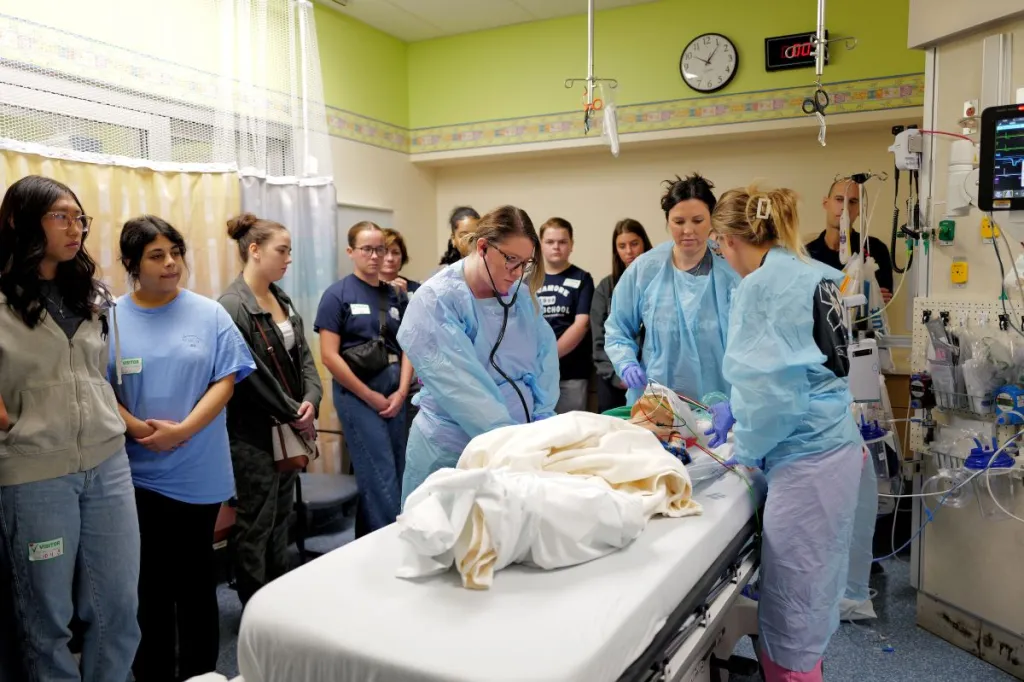Vanderbilt University School of Medicine Students
Multiple courses across all years of medical school
The Vanderbilt Department of Emergency Medicine offers multiple experiences and courses across all years of medical school to help students learn more about the specialty of emergency medicine and acquire the knowledge and skills to manage common emergencies.
Learn more about emergency medicine experiences and courses for Vanderbilt University School of Medicine students below.

Foundations of Medical Knowledge Phase
Observational Experiences
Interested Vanderbilt University School of Medicine (VUSM) students should email Auda Hutto to learn more.
Exploration of Emergency Medicine
This course is offered to all MS1s at VUSM interested in exploring the specialty of emergency medicine (EM) through observational shifts in the the Vanderbilt University Hospital Emergency Department, case-based learning on high yield topics, procedural skills lab, and an EM faculty Q&A. This is offered January-May.
Register through Medical Student Affairs.
Foundations of Clinical Care Phase
All EM courses in the FCC phase are two weeks long and are offered at various times throughout the academic year.
Emergency Medicine Elective
This course will introduce students to emergency medicine as a specialty and help students explore the different subspecialties within emergency medicine. There are didactic sessions, simulation and clinical experiences in the emergency department.
Ultrasound Elective
This course will introduce students to point-of-care ultrasound and offer hands-on opportunities for practice.
Immersion Phase
Emergency Medicine Advanced Clinical Elective (EM ACE)
This course fulfills the acute care requirement and is offered annually from April to September. The EM ACE will introduce students to emergency medicine and the initial management strategies for common life-threatening emergencies.
Students will develop an approach to common undifferentiated patient complaints and a practical skill set in basic airway management, electrocardiogram interpretation, and resuscitation. During the course there are didactic sessions as well as procedure labs and high-fidelity simulations.
Clinical shifts are spread across a variety of practice settings (adult and pediatrics) and offer a broad exposure to emergency care. On shift, students will work closely with emergency medicine faculty and residents to identify sick patients and develop differential diagnoses and management plans.
Emergency Care Integrated Science Course (ISC)
This course fulfills the acute care requirement and is offered in October, January, February and March. The goal of the course is to teach the foundational sciences of clinical medicine including anatomy, toxicology, ultrasound, systems of care, teamwork, and communication.
During the week, there are daily didactic sessions as well as procedure labs and high-fidelity simulation. There are also multiple scanning shifts to enhance point-of-care ultrasound skills. Clinical shifts are available in multiple emergency department settings.
Enhanced Emergency Medicine ACE (Triple EM)
Course director approval is required to register for this course. Approval is only granted for students who are deeply interested in emergency medicine or pursuing careers in EM and who have a need for additional EM experience (returning from a year out to pursue a secondary degree and need EM experience prior to doing an away rotation). Completion of the EM ACE is a prerequisite to the Enhanced ACE. Students will work full eight-hour shifts and have a workload similar to that of an intern.
Applying to an Emergency Medicine Residency
Below is an example of a typical timeline for applying to EM residency programs. It is presented as a guide for those considering a career in emergency medicine and is not meant to replace the guidance of a trusted advisor or mentor. It does not represent the only path to pursuing an EM residency.
1.
Applying to Aways
Winter of Year 3
- You will need to apply to three-five rotations. Most students only need to do one away rotation.
- You will use VSLO to apply to most rotations.
- Resources to find rotations include the SAEM Clerkship Directory and EMRA Match.
- You will need a CV to apply.
2.
Emergency Medicine Coursework
Winter/Spring Year 3
- This is a great time to take your EM coursework.
- VUSM students can take the integrated science course and the advanced clinical experience.
3.
Letters
Summer of Year 4
- You will get at least one letter of recommendation from your home EM rotation and one from your away rotation.
- This is a good time to think about who else can write you a letter of recommendation.
- Information about the Standard Letter of Evaluation (SLOE) used in the EM can be found here.
4.
Residency
Applications
Summer/Fall Year 4
This is the time to put together your ERAS application which will include at least the following:
- Personal statement
- Description of professional activities, accomplishments and research
